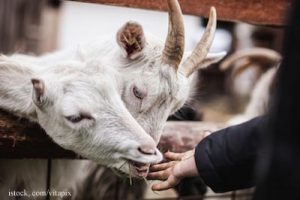The Connecticut Department of Public Health (DPH) is investigating an outbreak of seven confirmed cases of E. coli and two cases of hemolytic uremic syndrome (HUS). Patients sickened in this outbreak range in age from 2 to 25. Six of the seven patients recently visited the Oak Leaf Dairy Farm, a goat farm in Lebanon, Connecticut. The farm is not open for animal visits as a precaution.
 DPH Commissioner Paul Pino said in a statement, “earlier today, DPH was informed of several patients from Southeastern Connecticut who have become ill with E. coli. We are closely monitoring the situation and working with our partners at the CDC and other relevant stakeholders. We will continue to work diligently to provide the public with the information it needs as we investigate. We strongly encourage anyone who visited the farm in March and developed symptoms of this illness to contact their physician.”
DPH Commissioner Paul Pino said in a statement, “earlier today, DPH was informed of several patients from Southeastern Connecticut who have become ill with E. coli. We are closely monitoring the situation and working with our partners at the CDC and other relevant stakeholders. We will continue to work diligently to provide the public with the information it needs as we investigate. We strongly encourage anyone who visited the farm in March and developed symptoms of this illness to contact their physician.”
The symptoms of an E. coli infection include severe abdominal cramps, diarrhea that may be watery and/or bloody, a mild fever, nausea, and vomiting. Symptoms usually appear three to four days after exposure to the bacteria.
The symptoms of hemolytic uremic syndrome include reduced urine output, pale skin tone, fatigue, irritability, small bruises, unexplained bleeding from the nose or mouth, and a skin rash. Children under the age of five are most likely to develop this serious complication, which can cause kidney failure, stroke, and death. If anyone is experiencing these symptoms, they must see a doctor immediately.
There have been quite a few E. coli outbreaks related to ruminant animals, such as at petting zoos, in the past few years. These animals routinely harbor E. coli bacteria in their intestines, but do not become sick. The animals can shed the bacteria in their feces and it can get on their coats. When people pet the animals and then touch their faces, or don’t wash their hands before eating, they can easily ingest the bacteria.
Outbreaks have occurred at the Rice County Fair in Minnesota, that was linked to Zerebko Zoo Tran traveling petting zoo in 2014, and another at Huber’s Orchard in Starlight, Indiana in 2013. And in 2012, a deadly E. coli O157:H7 outbreak at the Cleveland County Fair Petting Zoo in North Carolina sickened more than 100 people. Often, these venues don’t provide enough hand washing stations for visitors to wash their hands after petting the animals.
Task forces have been looking at these events and venues and have made recommendations to prevent further outbreaks. They have stated that there should be a clear separation between food vendors and animal exhibits. Hand washing stations should be placed at entrances and exits of the zoo exhibits. All food vendors should provide pre-packaged, pre-portioned condiments to avoid hand pump devices for ketchup and mustard that are used by many people. And signage should be placed at each of the zoo’s entrances, warning people that there is a risk for serious illness from the animals at the venue.
The best way to protect yourself and your children if you choose to go to a farm or a petting zoo where there are ruminant animals is to wash your hands throughly after touching any animal. And watch the children carefully to make sure they do not put their hands anywhere near their faces after coming in contact with the animals.




